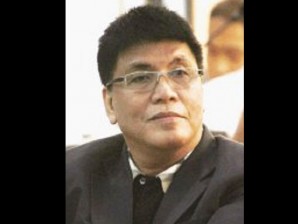A justice department prosecution panel on Wednesday ordered the filing of charges of corruption, malversation and banking law violation against former Local Water Utilities Administration (LWUA) board chairman Prospero Pichay Jr. for more than P480 million in losses suffered by the government in the acquisition of an ailing bank between 2008 and 2010.
The panel found probable cause to indict Pichay for violations of the Anti-Graft and Corrupt Practices Act, the Revised Penal Code and the New Central Bank Act.
Also indicted for the same offenses was acting LWUA administrator Daniel Landingin.
The case stemmed from the complaint filed by Finance Secretary Cesar Purisima against Pichay, Landingin and other LWUA trustees for the allegedly anomalous transactions entered into by LWUA in acquiring shares of stocks of a financially troubled bank, Express Savings Bank Inc. (ESBI), without obtaining the requisite approvals from the Department of Finance (DOF), the Office of the President (OP) and the Monetary Board (MB).
Losing bank
Investigations by the DOF and Bangko Sentral ng Pilipinas (BSP) showed that the LWUA paid more than P80 million to acquire approximately 60 percent of the outstanding capital stock of ESBI, when the actual book value of the block of stock was negative P31 million.
Despite the advisories from the DOF, OP and the BSP, the LWUA board of trustees approved on May 26, 2007, the acquisition of 445,337 shares of stock of the ESBI, which comprised 61.35 percent of the outstanding capital stock of ESBI in the amount of P80 million and, through Landingin, subsequently executed a deed of absolute sale dated June 3, 2009, with ESBI, again without obtaining the requisite prior approvals from the DOF, OP and BSP.
The DOF alleged that in further defiance of applicable regulations and without the approval of the MB and BSP, respondents took P400 million from LWUA funds, and deposited the money with ESBI in order to cover up the bank’s alleged severe capital deficiency.
The MB has since approved the recommendations of the BSP to deny the approval of the sale and transfer of stocks from the former owners to LWUA, issue a cease-and-desist order against ESBI, and impose sanctions on ESBI for accepting government deposits without prior authority from the MB.
The bank’s annual financial/audit reports, filed with the Securities and Exchange Commission, showed that it had consistently been suffering from “long-standing” problems and precarious financial condition for several years, even before the LWUA’s acquisition.
Despite such knowledge, however, Pichay and Landingin, went ahead and facilitated “what is effectively a bailout of an ailing bank on the verge of bankruptcy” with funds from the LWUA, exposing LWUA to great losses and dissipation of public funds and ultimately to the prejudice of the government.
Pichay’s defense
The panel found that the manner by which respondents into the transactions— “achieved by unlawfully taking procedural shortcuts and evading the required governmental approvals, and which, thus caused undue injury to LWUA’s funds and clientele”—constitutes unlawful acts and corrupt practices.
Pichay denied any wrongdoing and said there was no evidence shown that the ESBI’s investment resulted in an “undue injury” to the government. He said there was “no bad faith, gross inexcusable negligence or manifest impartiality” on his part during the transaction.
Cleared
The panel recommended the dismissal of the case against respondents Renato Velasco, Susana Dumlao Vargas, Bonifacio Mario Pena Sr., all former trustees of the LWUA, as they were not members of the board of trustees at the time the transactions took place.
The panel’s resolution, along with the entire records of the case, is to be forwarded to the Office of the Ombudsman for appropriate action.
LWUA is a government-owned and -controlled corporation as well as a specialized lending institution for the promotion, development and financing of local water utilities, and as depository of the reserves for capital improvement of local water utilities.
